Title search results
Showing 1 - 20 of 14033 items
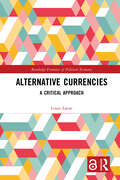
A wide variety of new forms of money have been developed in recent decades as a challenge or complement to…
the official, dominant currencies. LETS, local currencies, carbon currencies, and Bitcoins are all examples of this new trend. These currencies are at the heart of a larger movement that questions the present state of money and argues that new currencies might help to build resilient economies and “warmer” social relations.This book focuses on radical alternative proposals as well as on small-scale experiments, and makes use of the analytical tools of philosophy and of economics, with one main question in mind: can alternative currencies constitute desirable alternatives to the present monetary system? Overall, the book will raise serious doubts regarding the capacity of such currencies to deliver on their promises. In part, it will show that several arguments in favour of alternative currencies are lacking in consistency and clarity, and are thus in need of thorough revision. More fundamentally, it will argue that these currencies rarely succeed in fulfilling their objectives and that their fulfilment would entail significant conflicts with justice and economic efficiency.This book is addressed to researchers in economics, politics, and philosophy of money, especially those working on alternative monetary systems.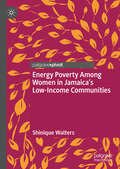
Energy Poverty Among Women in Jamaica’s Low-Income Communities
By Shinique Walters. 2025
This Palgrave Pivot investigates energy poverty in Jamaica, which is a growing problem that affects the mental, physical, and financial…
health of individuals, families, and communities, and its specific impact on women. Using quantitative and qualitative methods, this study demonstrates the shared relationship between energy development and economic development. It argues that the development of the energy sector has not been a gender-neutral process and has evolved and transitioned within the context of the global political economy, which has been irrevocably shaped and impacted by the lack of government regulation, an increase in efforts at privatization, and the effects of liberalization in terms of the development. Specifically, it shows that more often than not women bear the burden of sourcing, collecting, and using energy for household activities, agriculture, and income-generating tasks. As such, women are affected by energy poverty in many ways, including but not limited to time burdens and drudgery, health issues and physical burdens, as well as the issues that arise due to restrictions on information. This book will be of interest to students and scholars in gender studies, global development, economics, and politics, as well as policymakers and activists dedicated to gender equality and energy justice.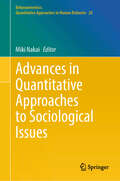
This edited book is the first one in English that demonstrates the innovative use of cutting-edge statistical methods for sociological…
and social science data. Unlike books that focus solely on applying quantitative methods to sociological and social science data, this book includes in-depth methodological discussions that highlight the interplay between sociological theory and data analysis. With expertise in sociology, psychology, social statistics, and survey methods and data collection, researchers in quantitative social science have developed extended, improved methods such as multivariate statistical analysis, survey methods, cluster analysis, multidimensional scaling, correspondence analysis, latent state model, network analysis, and other means tailored for cross-sectional, longitudinal, compositional, and network data to contribute to solving society's greatest challenges. The purpose of the book is twofold. One is to represent studies focusing on new directions in statistical analysis of sociological and social science data. These new directions may include novel theoretical paradigms, developing topical areas of research, innovative methodologies, and/or substantive findings that explore social processes. The other is to offer the most appropriate models and methods for explaining social phenomena and their underlying structures with the goal of discovering useful information, drawing conclusions, and supporting decision-making. The methodological discussions empower researchers to make informed decisions about research design, data collection, and analysis, enhancing the quality and validity of their sociological inquiries.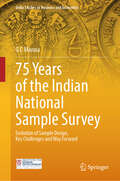
This book gives an overview of the Indian National Sample Survey (NSS) with a summarization of the salient features of…
the survey methodology adopted in the surveys, experiences gathered on the strengths and limitations of the data collected through the NSS and way forward to address some critical data gaps for further strengthening the NSS database. To fulfil the requirements of a diverse set of readers, the book also highlights the lessons gathered through some important pilot surveys that the NSS had conducted apart from containing a chapter on some global / best survey practices so that the book can truly be used as a reference material by the survey practitioners across the globe. It will also be of interest to a variety of other readers including the students, researchers, planners, and policymakers in addition to the survey organizations across the globe.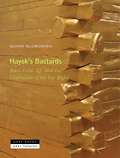
Hayek's Bastards: Race, Gold, IQ, and the Capitalism of the Far Right
By Quinn Slobodian. 2025
How neoliberals turned to nature to defend inequality after the end of the Cold WarNeoliberals should have seen the end…
of the Cold War as a total victory—but they didn&’t. Instead, they saw the chameleon of communism changing colors from red to green. The poison of civil rights, feminism, and environmentalism ran through the veins of the body politic and they needed an antidote.To defy demands for equality, many neoliberals turned to nature. Race, intelligence, territory, and precious metal would be bulwarks against progressive politics. Reading and misreading the writings of their sages, Friedrich Hayek and Ludwig von Mises, they articulated a philosophy of three hards—hardwired human nature, hard borders, and hard money—and forged the alliances with racial psychologists, neoconfederates, ethnonationalists, and goldbugs that would become known as the alt-right.Following Hayek&’s bastards from Murray Rothbard to Charles Murray to Javier Milei, we find that key strains of the Far Right emerged within the neoliberal intellectual movement not against it. What has been reported as an ideological backlash against neoliberal globalization in recent years is often more of a frontlash. This history of ideas shows us that the reported clash of opposites is more like a family feud.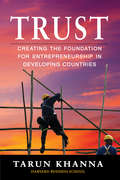
Trust: Creating the Foundation for Entrepreneurship in Developing Countries
By Tarun Khanna. 2018
TrustCreating the Foundation for Entrepreneurship in Developing CountriesEntrepreneurial ventures often fail in the developing world because of the lack of…
something taken for granted in the developed world: trust. Over centuries the developed world has built up customs and institutions like enforceable contracts, an impartial legal system, credible regulatory bodies, even unofficial but respected sources of information like Yelp or Consumer Reports that have created a high level of what scholar and entrepreneur Tarun Khanna calls "ambient trust." If a product is FDA-approved we feel confident it's safe. If someone makes an untrue claim or breaks an agreement we can sue. Police don't demand bribes to do their jobs. Certainly there are exceptions, but when brought to light they provoke a scandal, not a shrug. This is not the case in the developing world. But rather than become casualties of mistrust, Khanna shows that smart entrepreneurs adopt the mindset that, like it or not, it's up to them to weave their own independent web of trust—with their employees, their partners, their clients, their customers and with society as a whole. This can certainly be challenging, and requires innovative approaches in places where the level of societal mistrust is so high that, as in one example Khanna provides, an official certification of quality simply arouses suspicion—and lowers sales! Using vivid examples from Brazil, China, India, Mexico and elsewhere, Khanna shows how entrepreneurs can build on existing customs and practices instead of trying to push against them. He highlights the role new technologies can play (but cautions that these are not panaceas), and explains how entrepreneurs can find dependable partners in national and local governments to create impact at scale.As far back as the 18th century Adam Smith recognized trust as what Khanna calls "the hidden engine of economic progress." "Frankness and openness conciliate confidence," Smith wrote. "We trust the man who seems willing to trust us." That kind of confidence is critical to entrepreneurial success, but in the developing world entrepreneurs have to establish it through their own efforts. As Khanna puts it, "the entrepreneur must not just create, she must create the conditions to create."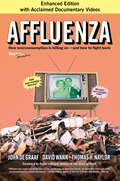
Affluenza: How Overconsumption Is Killing Us—and How to Fight Back
By David Wann, Thomas H. Naylor, John De Graaf. 2014
NEW EDITION, REVISED AND UPDATEDaffluenza, n. a painful, contagious, socially transmitted condition of overload, debt, anxiety, and waste resulting from…
the dogged pursuit of more.We tried to warn you! The 2008 economic collapse proved how resilient and dangerous affluenza can be. Now in its third edition, this book can safely be called prophetic in showing how problems ranging from loneliness, endless working hours, and family conflict to rising debt, environmental pollution, and rampant commercialism are all symptoms of this global plague. The new edition traces the role overconsumption played in the Great Recession, discusses new ways to measure social health and success (such as the Gross Domestic Happiness index), and offers policy recommendations to make our society more simplicity-friendly. The underlying message isn't to stop buying—it's to remember, always, that the best things in life aren't things.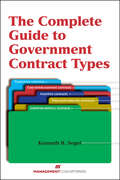
The Complete Guide to Government Contract Types
By Kenneth R. Segel. 2016
Everything You Need to Know About Government Contract TypesAs the world's single largest buyer of goods and services, the federal…
government has many ways to structure its procurements. Different situations and conditions often determine the best vehicle for a particular purchase. Contracting officers must assess a wide range of factors to determine which contract type will provide the government the best value and the least risk.The Complete Guide to Government Contract Types provides a comprehensive overview of the key government contract vehicles and types: fixed-price, cost-reimbursement, incentive, and other (which includes letter, indefinite-delivery/indefinite-quantity, and time-and-material contracts). The author first explains the selection process for contract vehicles, which is the basis for selecting the appropriate contract type for the work in question. He then presents a comprehensive, in-depth analysis of each contract type, explaining how each works best to meet certain types of requirements and conditions.This is an essential resource for both contracting officers and contractors seeking to understand and work effectively within the nuances of contract selection and compliance.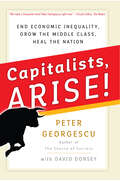
Capitalists, Arise!: End Economic Inequality, Grow the Middle Class, Heal the Nation
By Peter Georgescu. 2017
Peter Georgescu arrived in this country as a penniless Romanian refugee and rose to become the CEO of Young &…
Rubicam. This is why he's so heartsick that with flat wages, disappearing jobs, and a shrinking middle class, his kind of rags-to-riches story doesn't seem possible now. But he has a message for his fellow CEOs: we're the ones who must take the lead in fixing the economy.Marshaling deeply sobering statistics, Georgescu depicts the stark reality of America today: a nation with greater wealth inequality and lower social mobility than just about any other country in the developed world. But the problem isn't that free-market capitalism no longer works—it's that it's been hijacked by shareholder primacy. Where once our business leaders looked to the needs and interests of a variety of stakeholders—employees, community members, the business itself—now they're myopically focused on maximizing their shareholders' quarterly returns. Capitalists, Arise! shows how the short-term thinking spawned by shareholder primacy lies at the root of our current economic malaise and social breakdown. But Georgescu offers concrete actions that capitalists themselves can take to create a better future. The irony is that if businesses do this, shareholders will do even better. In the long run, businesses can thrive only when society is healthy and strong. This book is a manifesto calling on capitalists to heal the nation that has given them so much.
Federal Contracting Answer Book
By Terrence M. O'Connor. 2009
Thousands of contracting professionals have relied on the Federal Contracting Answer Book as their trusted guide to the highly regulated…
world of government procurement. In each edition the book has offered timely and accurate answers to the questions that arise daily in this complex field. Now in its third edition, this answer book is even more comprehensive. Written by experts who have extensive experience working in and teaching government contracting, the book includes all the latest changes and requirements. The question-and-answer format enables quick look-up and a concise presentation of the information. In this edition, new questions and answers have been added on avoiding proposal errors, debriefings, procurement vocabulary, regulatory changes, and best practices. In addition to these updates and revisions, the third edition includes new chapters on earned value management, GSA schedules, and contractor qualifications.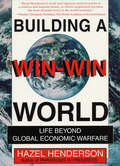
Building a Win-Win World: Life Beyond Global Economic Warfare
By Hazel Henderson. 1996
In Building a Win-Win World , world-renowned futurist Hazel Henderson extends her twenty-five years of work in economics to examine…
the havoc the current economic system is creating at the global level. Markets are now spreading worldwide-a spread which is often equated with the hope of democracy spreading along with it. But markets still run on old textbook models that ignore social and environmental costs-leading to a new kind of warfare: global economic warfare. Building a Win-Win World demonstrates how the global economy is unsustainable because of its negative effects on employees, families, communities, and the ecosystem. Henderson shows that win-win strategies can become the norm at every level when people see the true current and future costs of short-sighted, narrow economic policies. Henderson shows how humans are encountering the endgames of the competition/conflict paradigm, and identifies the signs of transition. Using warfare as a metaphor for the dark side of today's world economic system, she shows how both are destructive, inhumane, wasteful, irrational, inefficient, competitive, and crisis-driven. Both create more new problems than they solve. She describes how the globalization of the war system, technology, and industrialization brought the Cold War to a dead end. By the mid-1980s the global warfare paradigm had given ground to a global economic warfare which many economists, politicians, and business leaders hailed as a victory of capitalism and competitive "free markets." Yet this new type of warfare proved little better than the military warfare it was advertised to replace. By the mid-1990s global economic warfare had already reached crisis points of its own. Building a Win-Win World examines how jobs, education, health care, human rights, democratic participation, socially responsible business, and environmental protection are all sacrificed to "global competitiveness." Henderson shows many ways out of the dilemmas faced by all countries. New agreements are described to tame the global economic casino, regulate multi-national corporations, and levy fees for commercial use of global common resources-oceans, atmosphere, space, etc.-and tax their abuse. These revenues can then be invested in civilian needs and sectors worldwide. She also describes a trend toward "grassroots globalism"-citizens movements that are addressing poverty, social inequities, pollution, resource-depletion, violence, and wars. Grassroots globalism, she says, is about thinking and acting-globally and locally. It is pragmatic problem-solving, implementing local solutions that keep the planet in mind. Such social innovations can raise the ethical floor under the global playing field so that the most ethical companies and countries can win.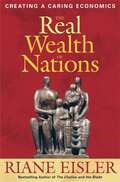
The Real Wealth of Nations: Creating a Caring Economics (Bk. Currents Ser.)
By Riane Eisler. 2007
Adam Smith's The Wealth of Nations provided the first, most influential and lasting explanation of the workings of modern economics.…
But with his focus on "the market" as the best mechanism for producing and distributing the necessities of life, Smith's concepts only told part of the story, leading to flawed economic models that devalue activities that fall outside of the market's parameters of buying and selling. The real wealth of nations, Riane Eisler argues, is not merely financial, but includes the contributions of people and our natural environment. Here, Eisler goes beyond the market to reexamine economics from a larger perspective--and shows that we must give visibility and value to the socially and economically essential work of caring for people and the planet if we are to meet the enormous challenges we are facing. Eisler proposes a new "caring economics" that takes into account the full spectrum of economic activities--from the life--sustaining activities of the household, to the life-enriching activities of caregivers and communities, to the life-supporting processes of nature. She shows how our values are distorted by the economic double standard that devalues anything stereotypically associated with women and femininity; reveals how current economic models are based on a deep-seated culture of domination; and shows how human needs would be better served by economic models based on caring. Most importantly, she provides practical proposals for new economic inventions--new measures, policies, rules, and practices--to bring about a caring economics that fulfills human needs. Like her classic The Chalice and the Blade, The Real Wealth of Nations is a bold and insightful look at how to create a society in which each of us can achieve the full measure of our humanity.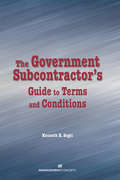
The Government Subcontractor's Guide to Terms and Conditions
By Kenneth R. Segel. 2008
Navigating Contract Terms and Conditions Just Got Easier!Organizations are at risk when contract terms and conditions are not fully understood.…
The Government Subcontractor's Guide to Terms and Conditions quickly guides you through the process of reviewing and negotiating contracts, identifying terms and conditions of concern, and mitigating potential risks. Author Kenneth Segel has tapped over 20 years of contract experience to write a handbook that walks even the most junior contracts administrator through the daunting task of reviewing and negotiating a government contractor's terms and conditions.This critical resource will help you• Determine what specific terms and conditions to address• Distinguish between a favorable and an unfavorable provision• Address potentially damaging provisions• Understand the potential economic impact of indemnification provisions• Apply risk management to address indemnification provisionsThe Government Subcontractor's Guide to Terms and Conditions will guide you through the inevitable challenges of the negotiation process. Put this updated resource to work in your organization today!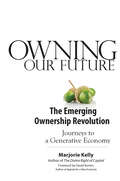
Owning Our Future: The Emerging Ownership Revolution
By Marjorie Kelly. 2012
As long as businesses are set up to focus exclusively on maximizing financial income for the few, our economy will…
be locked into endless growth and widening inequality. But now people are experimenting with new forms of ownership, which Marjorie Kelly calls generative: aimed at creating the conditions for life for many generations to come. These designs may hold the key to the deep transformation our civilization needs. To understand these emerging alternatives, Kelly reports from all over the world, visiting a community-owned wind facility in Massachusetts, a lobster cooperative in Maine, a multibillion-dollar employee-owned department-store chain in London, a foundation-owned pharmaceutical company in Denmark, a farmer-owned dairy in Wisconsin, and other places where a hopeful new economy is being built. Along the way, she finds the five essential patterns of ownership design that make these models work.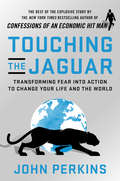
Touching the Jaguar: Transforming Fear into Action to Change Your Life and the World
By John Perkins. 2020
"This eloquent book inspires us to create a new reality of what it means to be humans on this magnificent…
planet."—Deepak ChopraThis all happened while Perkins was a Peace Corps volunteer. Then he became an "economic hit man" (EHM), convincing developing countries to build huge projects that put them perpetually in debt to the World Bank and other US-controlled institutions. Although he'd learned in business school that this was the best model for economic development, he came to understand it as a new form of colonialism. When he later returned to the Amazon, he saw the destructive impact of his work. But a much more profound experience emerged: Perkins was inspired by a previously uncontacted Amazon tribe that "touched its jaguar" by uniting with age-old enemies to defend its territory against invading oil and mining companies. For the first time, Perkins details how shamanism converted him from an EHM to a crusader for transforming a failing Death Economy (exploiting resources that are declining at accelerating rates) into a Life Economy (cleaning up pollution, recycling, and developing green technologies). He discusses the power our perceptions have for molding reality. And he provides a strategy for each of us to change our lives and defend our territory—the earth—against current destructive policies and systems.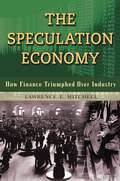
The Speculation Economy: How Finance Triumphed Over Industry (Bk. Currents Ser.)
By Lawrence E. Mitchell. 2008
American companies once focused exclusively on providing the best products and services. But today, most corporations are obsessed with maximizing…
their stock prices, resulting in short-term thinking and the kind of cook-the-books corruption seen in the Enron and WorldCom scandals. How did this happen? In this groundbreaking book, Lawrence E. Mitchell traces the origins of the problem to the first decade of the 20th century, when industrialists and bankers began merging existing companies into huge “combines”—today’s giant corporations—so they could profit by manufacturing and selling stock in these new entities. He describes and analyzes the legal changes that made this possible, the federal regulatory efforts that missed the significance of this transforming development, and the changes in American society and culture that led more and more Americans to enter the market, turning from relatively safe bonds to riskier common stock in the hopes of becoming rich. Financiers and the corporations they controlled encouraged this trend, but as stock ownership expanded and businesses were increasingly forced to cater to stockholders’ “get rich quick” expectations, a subtle but revolutionary shift in the nature of the American economy occurred: finance no longer served industry; instead, industry began to serve finance. The Speculation Economy analyzes the history behind the opening of this economic Pandora’s box, the root cause of so many modern acts of corporate malfeasance.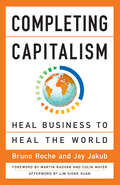
Completing Capitalism: Heal Business to Heal the World
By Bruno Roche, Jay Jakub. 2017
Proven, Profitable, and SustainableFor the past fifty years, leaders in the business world have believed that their sole responsibility is…
to maximize profit for shareholders. But this obsessive focus was a major cause of the abuses that nearly sunk the global economy in 2008. In this analytically rigorous and eminently practical book, Bruno Roche and Jay Jakub offer a more complete form of capitalism, one that delivers superior financial performance precisely because it mobilizes and generates human, social, and natural capital along with financial capital. They describe how the model has been implemented in live business pilots in Africa, Asia, and elsewhere. Recent high-profile books like Capital in the Twenty-First Century have exposed financial capitalism's shortcomings, but this book goes far beyond by describing a well-developed, field-tested alternative.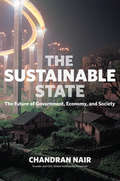
The Sustainable State: The Future of Government, Economy, and Society
By Chandran Nair. 2018
The free-market, limited government development model has been an ecological and social disaster for the developing world. Sustainable and equitable…
development is only possible with the active involvement of a strong central state that can guide the economy, protect the environment, and prioritize meeting their people's basic needs. In this sure to be controversial book, Chandran Nair shows that the market-dominated model followed by the industrialized west is simply not scalable. The United States alone, with less than five percent of the world's population, consumes nearly a quarter of its resources. If countries in Asia, where 60% of the world's population lives, try to follow the Western lead, the results will be calamitous. .Instead, Nair argues that development must be directed by a state that is willing and able to intervene in the economy . Corporations, which by design demand ever-expanding consumption, need to be directed towards meeting societal needs or otherwise restrained, not unleashed. Development has to be oriented towards the greatest good—clean drinking water for the many has to take precedence over swimming pools for the few. He provides three compelling case studies demonstrating the benefits of such strong state governance and the findings of weak state governance.This will mean rethinking the meaning of concepts like "prosperity," "freedom," and "rights," and whether democracy is always the best way to ensure responsive government—as Nair writes, "A democracy that cannot work to improve the life of its citizens is not better than a non-democracy that can actually improve quality of life." Many people will find these to be challenging ideas, but what Nair offers is a model suited to the realities of the developing world, not the assumptions of the dominant culture.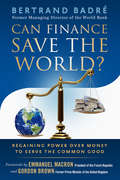
Can Finance Save the World?: Regaining Power over Money to Serve the Common Good
By Bertrand Badré. 2017
Can Finance Save the World?Regaining Power over Money to Serve the Common GoodJust as Thomas Piketty offered a sweeping critique…
and progressive reassessment of capitalism, former World Bank Group chief financial officer Bertrand Badré looks at the destructive role finance played in the global economic crisis of 2007–2008 and offers a bold prescription for making it a force for good. Badré says that finance is inherently neither good nor bad. It's just a tool—the most powerful tool on earth. Used correctly, it can be at the heart of the way we address many of the world's biggest problems, ranging from climate change to the eradication of poverty to building much-needed infrastructure. He describes innovations in financial tools and approaches that are already happening around the world and looks at the role regulation can play in channeling the power of finance in a positive direction. He details options for strengthening international cooperation for financial stability and prosperity and overcoming the blinkered nationalism currently on the rise. And he tells what is working and what needs to change in financing the sustainable development of the world. This book is rich with practical examples, some developed by Badré himself. For instance, he describes how at the World Bank he devised an innovative way to use insurance, a financial tool rarely considered in international development, to buttress fragile emerging economies against natural disasters and pandemics. Initiatives like these show that, as Badré writes, "when controlled and used intelligently, with benevolence and inventiveness, finance can accomplish great things."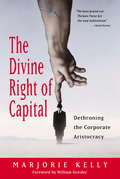
The Divine Right of Capital: Dethroning the Corporate Aristocracy
By Marjorie Kelly. 2006
* Updated paperback edition includes a new chapter and a Reader's Guide * Explores the real causes of the Enron…
fiasco and other recent corporate scandals * Explodes the myth that the stock market is "democratizing" wealth * Gives practical guidance to help employees and communities change corporate governance and unfetter the genius of the free market Wealth inequality, corporate welfare, and industrial pollution are symptoms-the fevers and chills of the economy. The underlying illness, says Business Ethics magazine founder Marjorie Kelly, is shareholder primacy: the corporate drive to make profits for shareholders, no matter who pays the cost. In The Divine Right of Capital, Kelly argues that focusing on the interests of stockholders to the exclusion of everyone else's interests is a form of discrimination based on property or wealth. She shows how this bias is held by our institutional structures, much as they once held biases against blacks and women. The Divine Right of Capital exposes six aristocratic principles that corporations are built on, principles that we would never accept in our modern democratic society but which we accept unquestioningly in our economy. Wealth bias is a holdover from our pre-democratic past. It has enabled shareholders to become a kind of economic aristocracy. Kelly shows how to design more equitable alternatives-new property rights, new forms of corporate governance, new ways of looking at corporate performance-that build on both free-market and democratic principles. We think of shareholder primacy as the natural law of the free market, much as our forebears thought of monarchy as the most natural form of government. But in The Divine Right of Capital, Kelly brilliantly demonstrates that it is no more "natural" than any other human creation. People designed this system and people can change it. We need a change of mind as profound as that of the American Revolution. We must question the legitimacy of a system that gives the wealthy few-the ten percent of Americans who own ninety percent of all stock-a disproportionate power over the many. In so doing, we can fulfill the democratic principles of our nation not only in the political sphere, but in the economic sphere as well.